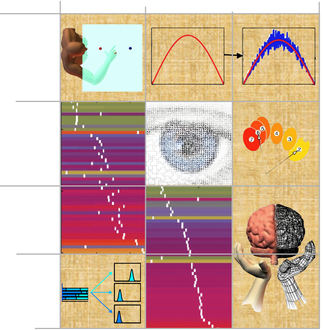The group uses engineering approaches to understand the brain and to develop artificial learning systems. Research includes Bayesian learning, computational neuroscience, statistical machine learning and sensorimotor control. The work on machine learning includes both theory and applications to vision, information retrieval and bioinformatics. The work on human learning includes both computational modelling and experimental approaches using robotic and virtual reality interfaces.

Biological learning
The brain is perhaps the most complex organ, consisting of myriads of elementary units (neurons and synapses), and it is still the greatest challenge of science to understand how their collective functioning gives rise to meaningful, adaptive behaviour. The seemingly effortless ease with which we perceive the world, extract relevant information from memory and move our lips when we speak masks the true complexity of the processes involved. This is evident when we try to build machines to perform human tasks. While computers can now beat grandmasters at chess, no computer can yet control a robot to manipulate a chess piece with the dexterity of a six-year-old child.
Using the formal approaches of computational neuroscience, a discipline that studies the nervous system through mathematical models, we have the hope both to understand the fundamental organising principles of the brain and to employ these to build more efficient machines. As the superiority of biological systems over machines is rooted in their remarkable adaptive capabilities our research is focussed on the computational foundations of biological learning.

Machine learning
Our research is very broad, and we are interested in all aspects of machine learning. Particular strengths of the group are in Bayesian approaches to modelling and inference in statistical applications. The type of work we do can range from studying fundamental concepts in applied Bayesian statistics, all the way to getting our algorithms to perform competitively against the state-of-the-art in big-data applications. We also work in a broad range of application domains, including neuroscience, bioinformatics, finance, social networks, and physics, just to name a few, and we actively seek to collaborate with other groups within the Department of Engineering, throughout the university as a whole, and with other groups within the UK and around the world. If you are interested in finding out more about our research, please visit our Publications page, or visit the individual research pages of our group members. You can also find our blog here.Recent updates (see all)
February 2025
Join us at Pembroke College on Saturday 1st March for our NeuroML symposium.
Attendance is free, but registration on EventBrite is mandatory.
Attendance is free, but registration on EventBrite is mandatory.
September 2023
Kris is now Dr Kris! He successfully defended his thesis entitled “Strong and weak principles of Bayesian machine learning for systems neuroscience” (examined by Yashar Ahmadian and Jonathan Pillow – thank you both!). Congrats, Kris!
September 2023
Flavia Mancini appointed Assistant Professor in Innovative Computational Methods starting January 2024 — CBL is delighted!